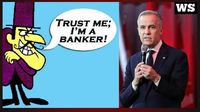Hollywood actor Tim Robbins, widely recognized for his role in the 1994 blockbuster film The Shawshank Redemption, has voiced strong skepticism over recent developments in Canadian politics, particularly regarding Prime Minister Mark Carney's rise to power. Robbins, who commands an audience of over 102,000 followers on social media platform X (formerly Twitter), took to the platform on Sunday, March 23, 2025, to question the legitimacy of Carney’s leadership.
In his post, Robbins posed a series of thought-provoking questions directed at Carney, who replaced former Prime Minister Justin Trudeau after being selected by a select group of Liberal insiders, bypassing a public election. “Has Carney ever been elected to Parliament or any other political office?” he inquired, highlighting Carney’s lack of democratic mandate. The actor’s inquiry did not stop there. Robbins also sought to shed light on Carney’s connections to the influential World Economic Forum (WEF), suggesting that Carney’s appointment may not prioritize Canadian interests.
“Where has he lived for the last ten years? What was his job?” Robbins continued, pressing for details about the Prime Minister's background. Robbins questioned whether Carney genuinely cares about the welfare of Canada or if his role is more aligned with carrying out the WEF's agenda, stating, “If so, how will it benefit Canada to surrender its sovereignty to unelected bureaucrats of the World Economic Forum?”
The context of Robbins' concerns stems from his perception that Carney’s policies and governance may reflect external influences, rather than domestic priorities. He took particular exception to the implication that Canada is becoming beholden to foreign powers, asserting, “Canada is Canada. Not a vassal state of the US and not a vassal state of the WEF.”
Carney’s appointment follows a turbulent period under Trudeau’s leadership, which faced criticism domestically and internationally for various policies, particularly concerning economic management and public trust. Robbins' comments resonate with a growing sentiment among some Canadians who feel disconnected from their political leadership, especially as the country navigates complex global challenges.
Further complicating Carney's position is his recent collaboration with Canadian actor Mike Myers in a campaign video. Robbins cited this promotional attempt as an example of inauthenticity, pointing out that neither Carney nor Myers have lived in Canada for at least a decade, making their connection to Canadian culture questionable. “Doesn’t sound very Gordie Howe to me,” Robbins remarked, alluding to the beloved Canadian hockey legend to question the authenticity of Carney's attempts to relate to Canadians.
Robbins' post, while critical of Carney, opens a broader discussion about the nature of political legitimacy and representation in modern democracies. As citizens increasingly turn to social media to voice their concerns, figures like Robbins can influence public opinion, engaging people in important political discussions.
The dialogue surrounding Carney's leadership underscores the concerns of Canadians about who is truly representing them and the implications of appointing leaders without direct public endorsement. Robbins' thoughts reflect a deeper unease about national sovereignty and the ability of everyday citizens to have a say in their governance.
This growing skepticism towards Carney and the Liberal government comes at a time when Canada must address numerous social and economic challenges. The public yearns for leaders who demonstrate not only expertise but also a genuine connection to the issues that affect their lives. As Canadians watch closely how Carney charts his course, the importance of political accountability and transparency has never been more crucial.
Moving forward, it remains to be seen how Robbins' inquiries and similar sentiments from the public will influence Carney's administration. Political analysts suggest that Carney will need to respond effectively to these concerns if he hopes to foster trust among Canadians.
In wrapping up his critique, Robbins emphasized, “Elbows up to both, folks,” a call to action for Canadians to remain vigilant and engaged with their political leaders, ensuring that the government works in the best interest of its citizens.

